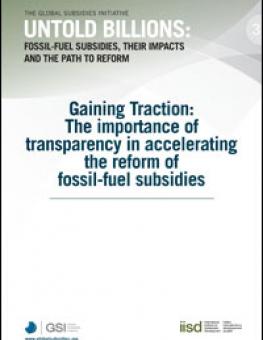
Gaining Traction: The importance of transparency in accelerating the reform of fossil-fuel subsidies
Transparency is the cornerstone of holding governments accountable for the ways in which they spend public money. As governments increasingly recognize that subsidizing fossil fuels undermines climate change, energy security and sustainable development objectives, good data and analysis will be vital for prioritizing reform efforts and monitoring their effectiveness. This paper addresses the role that increased transparency could play in fossil-fuel subsidy reform and specifically asks what information and mechanisms are needed to support the G-20 and APEC calls for reform. The paper considers the role of many of the inter-governmental and non-governmental organizations that currently contribute to the field and discusses options for developing a collaborative and comprehensive international system for evaluating and reporting fossil-fuel subsidies, concluding that a two-track approach is necessary: domestic action to improve accounting and reporting, and international action to develop a new data-gathering and management regime.
Papers in this series:
- Untold Billions: Fossil-fuel subsidies, their impacts and the path to reform: A Summary of Key Findings
- Effects of Fossil-Fuel Subsidy Reform: A review of modelling and empirical studies
- The Politics of Fossil-Fuel Subsidies
- Strategies for Reforming Fossil-Fuel Subsidies: Practical lessons from Ghana, France and Senegal
- Gaining Traction: The importance of transparency in accelerating the reform of fossil-fuel subsidies
- Mapping the Characteristics of Producer Subsidies: A review of pilot country studies
For information about the GSI's other reports on fossil-fuel subsidies, click here.
Participating experts
You might also be interested in
November 2024 | Carbon Minefields Oil and Gas Exploration Monitor
In October 2024, 20 oil and gas exploration licences were awarded across three countries, with a significant portion granted by Brazil.
Green Public Procurement in Indonesia
This report explores the state of green public procurement (GPP) in Indonesia and offers key strategies for advancing sustainable procurement practices.
Sustainable Asset Valuation (SAVi) of Aquaculture in Madagascar
In this integrated cost-benefit analysis, the Nature-Based Infrastructure Global Resource Centre analyzes the potential of sustainable aquaculture practices to enhance nutrition and protect the environment in Madagascar.
Navigating Global Sustainability Standards in the Mining Sector
This brief examines the latest developments and trends in responsible mining standards and voluntary sustainability initiatives.